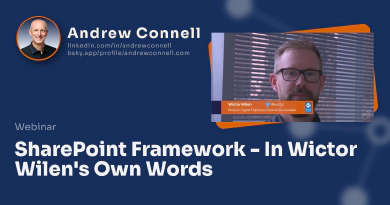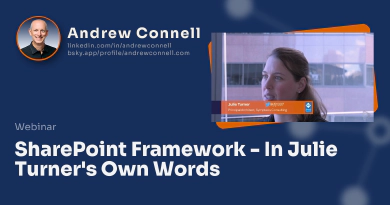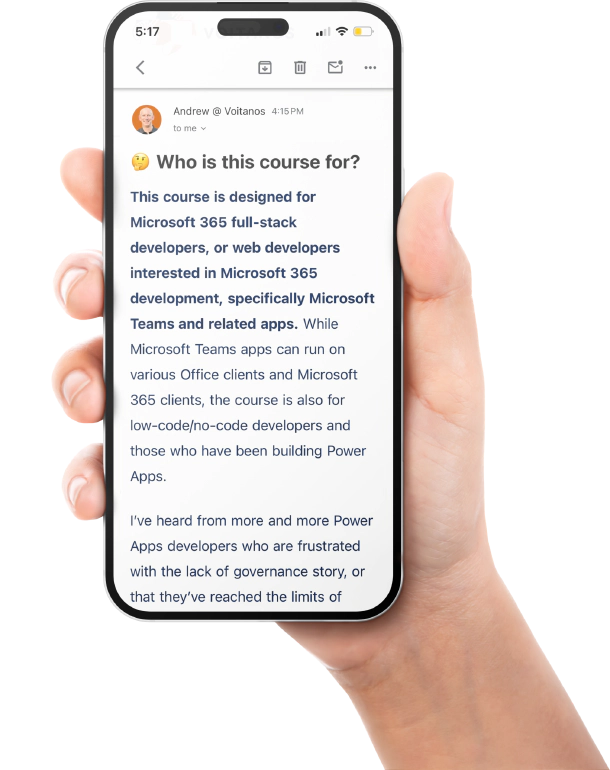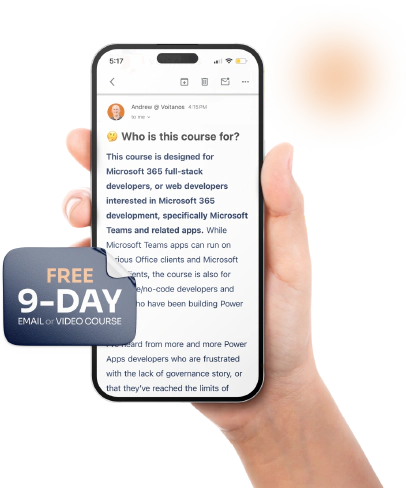This is one installment in our series “In Own Words” by Voitanos asking experienced SharePoint developers to share their thoughts on the new development model for SharePoint - the SharePoint Framework. In this series, we ask each person a series of questions and let them share their thoughts.
Amit Vasu
My name is Amit Vasu. I’m a senior consultant, Office 365 in SharePoint. I’m an independent consultant from Toronto, Canada and I’ve been specializing in custom development using SharePoint and Office365.
What’s your background as a SharePoint developer?
My background as a SharePoint dev goes all the way back to SharePoint 2003. I must thank a program manager Dan Winter who back in the days used to blog about a lot of APIs and web services on SharePoint 2003. That’s when I started getting into SharePoint. I probably left a few web & site objects open and tank the farm, but after 2007 onwards all the custom development that Microsoft SharePoint started offering … Spent a lot of time on server-side coding up to SharePoint 2010 and 2013 onwards I jumped onto on client-side. So fairly confident on the server-side, but a lot of experience on the client-side as well, using CSOM/REST. Didn’t spend too much time onAdd-in model or App model , or the app model, but started spending time with SharePoint Framework, as well so.
How much time have you spent with the SharePoint Framework?
I’ve spent time on my dev tenants. I’ve created a dev tenant and I’ve been playing with SharePoint Framework on and off. When initial SharePoint Framework [Web Parts came, I created a few Web Parts, deployed into the dev tenant. Nothing in the prod yet, but I’ve been trying and understanding how all the dependencies work, what does the templating look like, and stuff like that. And then after that, there was some gap and then again, started picking up on the Framework extensions that are coming out. I’ve been spending time on learning what can and cannot be done using those extensions. So my experience on SharePoint Framework is mostly on the dev-side, but I would say I’m fairly confident in understanding what the Framework architecture is and how things work.
What is your impression of SharePoint Framework today?
I think SharePoint Framework with the introduction of custom extension is in a pretty good state if you are building something against, or you’re doing certain things on SharePoint, on-prem and you wanted to start doing certain things in the SharePoint online. I think the SharePoint Framework does allow you to customize various part of your SharePoint implementation. So I think it’s a good start. I still think that they need to iron out a few things in terms of ALM and Visual Studio part; their citizen devs would probably have some issues, but other than that, I think it’s a good start and looking at the Roadmap I think it looks pretty good too.
What is your impression of the SharePoint Framework roadmap?
I think looking at the Roadmap, they are definitely going in the right direction, especially with bringing Framework on-prem. Giving the parity for SharePoint devs to start building Framework components on-prem as well as SharePoint Online, so that consistent dev experience when they move from on-prem to SharePoint Online, that’s a huge thing.
Also, looking at the Roadmap, the ALM story, I think it’s definitely must-have and looking that into the Roadmap definitely helps a lot of devs. And in terms of in your building, your devs, a lot of companies move into that cycle of your building, continuous deployment, continuous testing, and approval, and stuff like that, and having that story early ironed out is definitely a nice to have. So I looked at the Roadmap, there are a few things that I also liked about their like Graph API access too, from the SharePoint Framework.
So overall, I think the Roadmap looks pretty good and as I say, if they can continue working what they’re promising and then delivering, and especially with the Framework, a little more bullish and sticking my neck out, that then the future Framework definitely would be replacing a lot of server-side things that we used to do. So I’m pretty happy to see where Microsoft is going with the Framework Roadmap.
What is your favorite part of the SharePoint Framework?
It as to be the work bench. And for me, the work bench Is definitely one of the things that gives you that flexibility to build against local environment as well as running that same work bench against the context of SharePoint Online. And that helps with a lot of development that you are doing it. As a dev and you’re building something, you don’t need to be installing entire SharePoint on that machine. So having something that you can just run and execute your code and see how it will work, is definitely a nice to have, and for me, that’s one of the best things that SharePoint Framework gives you, when you are building any custom web part and wanted to try it out, running locally and in running in context of SharePoint Online.
What is the one thing you would add to the SharePoint Framework?
I’ve always said that in the Roadmap, I think one of the things that they must have is a solid ALM story, from deployment, to approval and even having some support for automated testing because that’s the way most enterprise developments are happening and not having that story around SharePoint Framework is going to effect the user of the SharePoint Framework, the adaption that enterprise devs companies going to bring back that Framework and to start building against it is going to be a waste of energy because their ALM process is pretty ironed out for the most part and adding something new, where the ALM story is not that great is something we’re going to be challenging with the adaption. So I think they should definitely put that in the backlog and that would be something that I think they should add.
What is the one thing you would change to SharePoint Framework?
Actually, so, if I would go back, and I would have to change something I think having SharePoint Framework available with a studio template probably would have been a better option, in terms of adoption because Microsoft would have to understand the there are a lot of citizen devs and SharePoint server product is, I would consider, a commodity. So a lot of devs, working in house, are quite used to Visual Studio and getting to learn something totally new, in terms of Visual Studio Code and stuff like that, it doesn’t help that adaption that Microsoft probably would like to see because the whole adaption piece is going to bring that SharePoint Framework live. So I think that is something, that if I could change, I would definitely change. Yes, there is extension that Vesa & Eric Shupps has worked on that’s definitely good. As an independent consultant, I mean, that’s not so bad for me because then I can help a lot of companies with building custom devs, but if Microsoft is looking for more adaption I think Visual Studio’s templating would have been a better approach going with the SharePoint Framework.
What is the biggest challenge with SharePoint Framework?
Yup. So a continuation of my previous answer, I think the biggest challenge with SharePoint Framework is the learning curve because when Microsoft introduced SharePoint Framework they would definitely be adding on adoption of SharePoint Framework across the enterprise dev people that are currently running SharePoint 2016 on-prem and that whole learning curve that as a dev, that they have to go through, not having a Visual Studio template, or spending time learning Node manager, or Node Package Manager, or Yeoman and trying to understand, getting their head around it, what are the dependencies that they have to worry about, and things like that it’s a huge learning curve.
And that’s where one of the biggest challenges … Because as a dev who has not gone outside of the Visual Studio, and learning something new, and with the learning is not just another web part that they’re building, there are other things that they have to be aware of, so I think Microsoft is doing great job on providing a lot how-tos and articles, but I think more clarity around all the other dependencies outside of the SharePoint Framework probably would help a lot of devs as well. So I think the biggest challenge for devs is the learning curve around building something using SharePoint Framework.
Predict the future - Where do you see the SharePoint Framework Going?
I think in the next six months, or 12 months, I think SharePoint Framework is definitely a good start. The way I see it is Microsoft started trying to fill out all the existing gaps and Microsoft, looking forward to looking at what’s coming in the future. So I’m not, other than the add-in model, I think Framework is here to stay and that’s how I predict that the SharePoint Framework is going to continue to have more and more features, more components that we can use, similar to extensions. So my prediction in terms of SharePoint Framework for the next six months, or even two years from now, is it’s going to stay. It’s mostly going to try and replace most of the stuff that we used to do with the server-side model on-prem, and allowing similar functionalities and features for all the devs to the SharePoint Online, and on the on-prem as well.
Do you have any Advice or Words of Wisdom?
One thing that I would definitely advise is on the training. So anyone that wanted to get started on SharePoint Framework, definitely go check all the Microsoft how-tos. It’s for very, very beginners that just want to get started on it. How to set-up your dev environment and stuff like that, but one thing, not just because Andrew’s interviewing me, but I have gone through, back in 2007, Andrew’s training course on WCM and it’s still in my head, how WCM works in SharePoint. So if you’re definitely looking for some professional training, I would recommend Andrew Connell’s webinars. I hope I pronounced it right. To be considered as your training material because as I said, I can swear to the training course that I have taken and I hope Andrew has not lost his charm with the SharePoint Framework as well.
So that’s my recommendation and one other thing that I would recommend is don’t be afraid. The change is always going to be there and Visual Studio, probably. And I think once they started using Visual Studio Code, they probably…not after six months or so…they probably would not want to go back to Visual Studio. So trying new things out is definitely what I would advise and for the training, as I say, starting Microsoft’s all the how-tos and any professional training that I recommended, and Andrew’s training.







